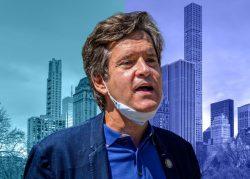A tax on luxury second homes in New York City would yield far less revenue than expected, an agency charged with crunching numbers for lawmakers has found.
The Independent Budget Office quietly dropped its revenue estimate for the proposed pied-à-terre tax by 41 percent this month.
Read more



The IBO now estimates the tax would generate $232 million annually, down from the $390 million a year it forecast Dec. 1. George Sweeting, deputy director of IBO, said the agency realized far fewer homes than originally thought would qualify as pieds-à-terre worth $5 million or more.
He noted the numbers are not final and that there’s “an awful lot that’s unknown.”
The IBO is a nonpartisan city agency that estimates budget figures for the city, including the savings or revenue proposed measures would generate. The city needs to close a $5.25 billion deficit, Mayor Bill de Blasio said last week in proposing a $92.3 billion budget for the year beginning July 1.
Any tax on second homes would have to be enacted by state law.
The pied-à-terre tax, championed by state Sen. Brad Hoylman, D-Manhattan, would increase annual property taxes for one- to three-family homes with a market value of $5 million or more, and condos and co-ops with an assessed value over $300,000, if the property is not a primary residence.
The yearly tax, which state legislators considered but excluded from the budget passed last March, would range from 10 percent to 13.5 percent of the assessed value for condos and co-ops, and 0.5 to 4 percent for one- to three-family homes, with pricier properties being taxed at the higher rates.
The real estate industry ardently opposes the tax, claiming it will drive away luxury buyers, dampen future development, reduce jobs and pull down home values. Industry-led lobbying groups have formed in recent months to mobilize against the bill with members including real estate agents, labor unions and homeowners.
One such group, the NYC Homeowners Coalition, which counts the Real Estate Board of New York and labor union 32BJ as members, said the downward revision doesn’t surprise them.
“We knew all along that the numbers they were coming up with just didn’t make a lot of sense,” said Stuart Saft, a partner at Holland & Knight and chair of the NYC Homeowners Coalition.
The coalition estimates that the tax will cost the state $430 million annually in lost revenue from sales and development that the new levy would deter. If the coalition’s forecast is accurate, that would mean the tax would have a net loss of $198 million a year.
“It won’t help the state financially,” Saft predicted.
Supporters say it would marginally reduce the sale price of a few thousand properties whose owners could readily afford it, and that the vast majority of second homes would be unaffected. The IBO’s Sweeting said the agency’s calculations assumed the tax would cause a small reduction in demand for expensive second homes.
The proposal for an annual pied-à-terre tax has been around for years, but garnered new momentum in early 2019 after hedge funder Ken Griffin purchased a sprawling residence at 220 Central Park South for a stunning $238 million, for which he would pay an estimated $516,000 in property taxes as of that year.
The purchase drew renewed attention to the city’s problematic property tax system, and, as the state scrambled for additional revenue sources that spring, Hoylman’s long-dormant bill for a yearly pied-à-terre tax became a front-burner issue.
The bill was dropped after challenges to implementing the tax — notably what to do if co-op owners don’t pay — proved too onerous for lawmakers, but Hoylman hasn’t given up.
The senator said the bill would be a “priority” in the 2021 state legislative session.
When asked about the IBO’s downward revision, Sen. Hoylman said the revenue would still be better than nothing.
“A [pied-à-terre] tax on luxury second homes would bring New York City an additional $232 million in revenue it does not have today,” he said in a statement. “With the deficit currently staring us in the face, it is not unreasonable to ask those who can afford to buy a multimillion-dollar second home in New York City to pay a little more to keep our subways and schools running.”
